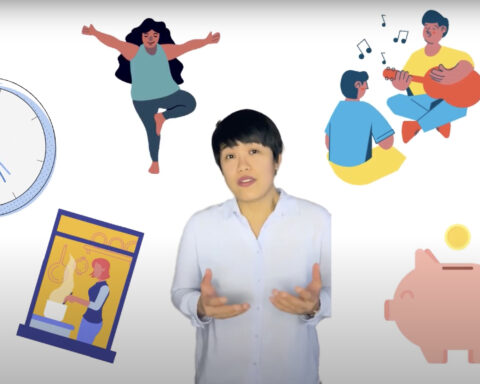A Statistics Canada study shows that since 1994, the highest percentage of immigrants fall under the “economic class,” with a projected 60 per cent for 2020. Immigrants, who account for one-fifth of the Canadian population, help offset challenges from an aging population and declining birth rate. “Growing immigration levels, particularly in the economic class, will help us sustain our labour force, support economic growth and spur innovation.” says the Minister of Immigration, Refugees and Citizenship as quoted in the 2018 annual report to the parliament.
Amidst this boost in economic immigration, a 2017 report by Munk School of Global Affairs, UofT, says: “First, skilled immigrants often do not succeed in getting those professional and other highly skilled jobs for which they are presumed to be qualified. As a result, pervasive underutilization of the skills of highly educated immigrants—‘brain waste’—is a serious issue in Canadian immigration.”
Senior finance executive finds healing in art
Dhanya Mohan’s 14 years of international experience in corporate finance in India and Bahrain wasn’t enough to land a Canadian job as CPA is a requirement cited by many employers. “There’s a lack of synergy between policy makers and the corporate world. Why did I get through express entry? Because they think my skills will be of use here. But I didn’t come here to work in Tim Hortons.” Mohan added that she doesn’t disrespect survival jobs, but said high-skills are not required for such jobs.

Economic immigrants like Mohan are accepted based on their potential to contribute to the Canadian labor market through a points system based on language proficiency, professional qualifications and work experience. Though a majority of Candian immigrants are carefully selected on a merit based point system, many are unable to find work commensurate with their education and training.
“With a small child, it was not possible for me to take up CPA. Also, child-care costs are prohibitive.” Citing lack of support system for immigrants, Mohan said she may be able to join CPA next year once her child is settled in school. “But then, I will be hitting 45. By the time I finish CPA, I would be 48. Who would recruit me, with no Canadian experience?”
“It’s Macrame art that saved me,” said Mohan about the hobby she started in 2019. “Ever since, the threads have healed me, it’s so meditative.” According to Mohan, immigrants overcome many challenges and have international exposure which many native-born professionals cannot claim. “How can someone negate all that and push you to a corner?” She asks.
Mohan said she worries for the unexploited, high-skilled immigrant talent pool. “Does anyone know what happens to them? Has any study been done on their mental health?” A 2012 study on immigrant mental health mentions that there is limited Canadian research on the mental health of recent immigrants. As per the study, 29 per cent of immigrants reported having emotional problems and 16 per cent reported high levels of stress.
Experienced gynecologist and internal medicine professor make big sacrifices
When Egyptian gynecologist and obstetrician, Dr. Tamer Hosny, moved to Canada in 2011, his dream was to provide a safe haven for his children. “I wanted a good future for my children,” he said. But after landing in Canada, Hosny said life has not been easy. “I worked day shifts and night shifts, cleaned washrooms, worked at Tim Hortons and in manufacturing. It was really hard.”

Hosny had 15 years of experience in Egypt when he made the move. After clearing two medical council qualifying tests, while waiting to take the third, he got into real estate. “The qualifying tests are not difficult. Once you clear the three tests, you would be called for an interview. If you clear that, then you do residency for 5 years. But the conversion rate is only 2 per cent in Ontario.” Hosny said he had to take care of his family, so he took up odd jobs. “It was very hard. I didn’t have the luxury to choose.”
Hosny’s wife, who holds a Phd in Internal Medicine, was an Assistant Professor in the University of Cairo. She is now a student counselor in a community college. Although the initial years were the toughest, Hosny said he wouldn’t be able to provide the safety and security back home in Egypt. “The safety and security here is priceless. My children are happy here.”
Did Canada fulfil the dreams Hosny had when he moved? “I don’t have any dreams now. My dreams are now for my children.” Although he hasn’t been able to use his hard-earned skills, he said he is still waiting. “I request the Canadian government and policy makers to give us a chance to prove ourselves, to use our experience.”
Hosny is not alone. In Ontario, there are 13,000 foreign-educated doctors and 6,000 foreign-educated nurses who aren’t working in their fields. A 2016 report indicated that nearly 850,000 Canadians are unemployed or underemployed, more than 60 per cent of whom are immigrants, because their credentials are not being fully recognized. Not recognizing immigrants’ skills and credentials — as well as those with out-of-province credentials is costing the economy up to $17 billion a year.
Canada fails ex-UN consultant with work experience in four countries
Nanyi Albeuro, who arrived in Canada in 1991, has never been offered a permanent position. “I was in tears when I left my job in UNEP, Nairobi, as Editor. I had applied for PR and moved, as my sister was here.”

The first non-British editor of The Peninsula magazine in Hong Kong, she has also been a copywriter in Singapore. After being in many short-term, contractual positions in Canada, she enrolled in the year-long Media for Global Professionals program at Sheridan College in 2010. “I graduated with honours, had great references and applied left, right and centre, but nothing happened.” In 2013, she joined Humber College to learn Social Media for PR. Things haven’t changed in spite of her constantly upskilling herself.
“People here are very insular. I was warned against the insularity,” said Albeuro, quoting a communications director who interviewed her for a contractual position. “After my interview, she said, ‘Ms. Albeuro, you’ve lived all over the world, you must be very lonely.’” Albeuro didn’t get the job.
Albeuro said the concept of “survival jobs” was new to her until she arrived in Canada. Currently, she is a part-time English conversation instructor at a senior adult services facility. “Don’t sideline us, we are not asking for handouts. We are offering you an international mindset.” She said as a message to the employers.
“I am a consummate networker, I met fellow media professionals, attended seminars and events, but it didn’t lead to anything.“ Though the popular networking advice hasn’t worked in Albeuro’s case, she has a message for skilled immigrants, coming to Canada. ”Don’t sit in a corner and disappear. If you hide, you are marginalized even further. Network, don’t be in your ghetto.”
A September 2020 Deloitte Canada study says boosting the number of hours worked in the economy would reverse Canada’s economic slowdown and lift the pace of yearly economic growth by 50 per cent, adding $4,900 to Canadians’ average annual income by 2030 without raising tax rates. Deloitte says Canada needs to be more inclusive of groups that are underemployed in the economy such as women, immigrants, people with disabilities and Indigenous Canadians.
Do the policy makers and employers care?
Photos provided by the interviewed.
Minu Mathew is a writer and communication consultant who has worked closely with brands like Philips, 3M and Microsoft. She has a book of poems titled ‘In the Garden of Rain’ published on Amazon. Minu has lived in India, Sweden, US and UK. She currently lives in Toronto, Canada with her husband and two children.






Excellent article Minu Mathew!! Lemme add something more, precisely to the why’s of this.
1. The so called educated and experienced persons often fail to project themselves, be it with a proper CV, a LinkedIn profile or presenting themselves at an interview.
2. The first step is to get an interview and for that a proper CV and if possible an internal reference would be the best to work.
3. Those who get passed the first step of finding interviews could get themselves equipped on their presentation skills, speaking about themselves and proving what they claimed on the CV was true. This is where often people get stuck because most who claimed to have excellent experience and education fail to demonstrate that in an interview.
4. Such previous experience with recruiters adversely affect other new immigrant applicants who even though may have excellent education and experience and could actually prove it, but often fail to get an interview scheduled.
5. Last but not the least, the mentality of those immigrated earlier is something that has to be drastically changed. There could be people who came in years before, struggled through survival jobs and might have reached a position , say , mid management in a company. They would not want a new immigrant,how much ever educated or experienced or skilled to get a job that actually matches their skill set rather pushes/ advices them to start from the scratch, or even survival jobs. ( There are exceptions too)
To quote example, I have witnessed a technology professional, having an MBA from a Top ranked b school in the world( ranked much above any B school in Canada) struggling to find a job and was forced to end up in a survival job at a retail shop as a cashier. She had almost a decade of experience working in Europe, India ,Uk with top tech companies and updated her education with an MBA, still couldn’t make a mark. She returned to her home country to happily pursue her career in a much better way than she would have ended up in Canada
Another example of a senior corporate banker, after getting so called advices from many to get the foot in the door, she joined a bank as a part time teller, took 3 years to move into the entry level position in corporate banking. Though she had to go through a lot of mental trauma, she survived that, to atleast end up in her line of expertise. And she says it was mere luck that happened because instead of getting internally supported she was always pulled down by her managers whenever she applied for jobs. And what now? It may take another 10 years to reach the level what she was back in her home country. Be it for salary in terms of purchasing power parity or skill set and responsibilities.
I dont think, the government would step into helping the immigrants with better jobs because there is always shortage of labour in the labour job market and that is where most immigrants end up. All we could expect is the earlier immigrants to come forward to help the new comers to network, provide internal reference or tailor a CV. If meticulously done, this may help deserving new comers ending up high paying jobs and positions which may often be above the earlier immigrant’s current status; something they had struggled for years or decades to achieve.
The question is how many of them would be ready for that selfless act????
Thank you, Matthew, for your valuable comment. As someone who has lived and worked in other countries, it came as a surprise to me that a newcomer or immigrant in Canada has so many barriers to find a suitable position. The encouragement that established immigrants could give newcomers can never be discounted. The examples that you quoted are quite heart-breaking and insightful at the same time. Those are the stories that need to be told, and shared, so at least in the near- long term, we are able to influence the recruitment industry, for the betterment of immigrants.
Nice article!
I have been reading back home in India about the brain-drain to the benefit of countries like US. The term “brain-waste” for Canada is apt for the situation I am also witnessing for more than a year now. I personally experienced the recruitment approach in Canada, is close-minded, kind of black-hole, as once you apply, you don’t get any response in return except some companies do revert with formal reply of position closure. Follow-ups are not useful either.
Contrary to that, to my experience, employers in developing countries like India are open-minded and they create a pool of qualified candidates by interviewing them and keep channels of interaction open so that when they find a suitable vacuum, they would hire them, instead of painstaking recruitment process each time. In fact, back home, the placement consultants also do their job very well for skilled people. In Canada, I have experienced the job-fairs, institutions helping immigrants are just doing superficial work. When I asked a senior job fair organizer,whether he can present percentage of people actually recruited through this job fair, answer to which he skirted out easily. These are just fairs, and when you participate they would tell you to go and apply on the portal..! So, what’s the point in participating in the fair? It’s utter waste of time, energy and government funding.! I also don’t understand, when the companies including government ones state that if there are internal applicants, they would be given first priority. If that is the case, why do they give false hope to external candidates and advertise the jobs in first place?
Employees are assets of the company, and it’s painful that the employers are not investing time to communicate and know the potential employees and their skills/ achievements. Effective communication, however is expected of the immigrants as one of the prime requirements. It is also in the interest of the Government that if they structure a conducive framework for settlement of employees faster, they would in-turn contribute in the country’s economy faster through business growth, consuming/spending and investing.
Ontario Human Rights Commission have at least conducted some studies and made policy guidelines to deal with such issues-Canadian Experience (http://www.ohrc.on.ca/en/policy-removing-%E2%80%9Ccanadian-experience%E2%80%9D-barrier) , not sure about the actual level of implementation though and whether same is being monitored effectively or not. Also not sure about actions in other provinces.!?
Nice article!
I have been reading back home in India about the brain-drain to the benefit of countries like US. The term “brain-waste” for Canada is apt for the situation I am also witnessing for more than a year now. I personally experienced the recruitment approach in Canada, is close-minded, kind of black-hole, as once you apply, you don’t get any response in return except some companies do revert with formal reply of position closure. Follow-ups are not useful either.
Contrary to that, to my experience, employers in developing countries like India are open-minded and they create a pool of qualified candidates by interviewing them and keep channels of interaction open so that when they find a suitable vacuum, they would hire them, instead of painstaking recruitment process each time. In fact, back home, the placement consultants also do their job very well for skilled people. In Canada, I have experienced the job-fairs, institutions helping immigrants are just doing superficial work. When I asked a senior job fair organizer,whether he can present percentage of people actually recruited through this job fair, answer to which he skirted out easily. These are just fairs, and when you participate they would tell you to go and apply on the portal..! So, what’s the point in participating in the fair? It’s utter waste of time, energy and government funding.! I also don’t understand, when the companies including government ones state that if there are internal applicants, they would be given first priority. If that is the case, why do they give false hope to external candidates and advertise the jobs in first place?
Employees are assets of the company, and it’s painful that the employers are not investing time to communicate and know the potential employees and their skills/ achievements. Effective communication, however is expected of the immigrants as one of the prime requirements. It is also in the interest of the Government that if they structure a conducive framework for settlement of employees faster, they would in-turn contribute in the country’s economy faster through business growth, consuming/spending and investing.
Ontario Human Rights Commission have at least conducted some studies and made policy guidelines to deal with such issues-Canadian Experience (http://www.ohrc.on.ca/en/policy-removing-%E2%80%9Ccanadian-experience%E2%80%9D-barrier) , not sure about the actual level of implementation though and whether same is being monitored effectively or not. Also not sure about actions in other provinces.!?